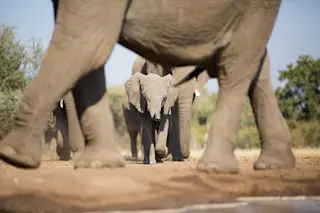Latest findings about newborn elephants and herd behavior are, “remarkable,” according to behavioral researchers at the University of Oxford in collaboration with Save the Elephants (STE), a non-profit based in Kenya. Researchers investigated how elephant herds alter their behavior after a mother gives birth and found, they don’t.
“It's slightly unexpected,” says Dr. Lucy Taylor, a junior research fellow and the study’s lead researcher whose findings were published in the journal Animal Behaviour.
Taylor predicted to find a slowdown, or “dip,” in the herd’s movement. But instead found the ability and need ‘to keep up,’ which may explain why elephants have the longest pregnancy of any mammal. Further, she postulates that elephants may have evolved their long gestation period to help herds stay together and remain protected.
“It's actually incredible. Think about it. These elephants give birth to a baby, basically 100-kilogram baby [220 pounds], and then carry on. How? ...














